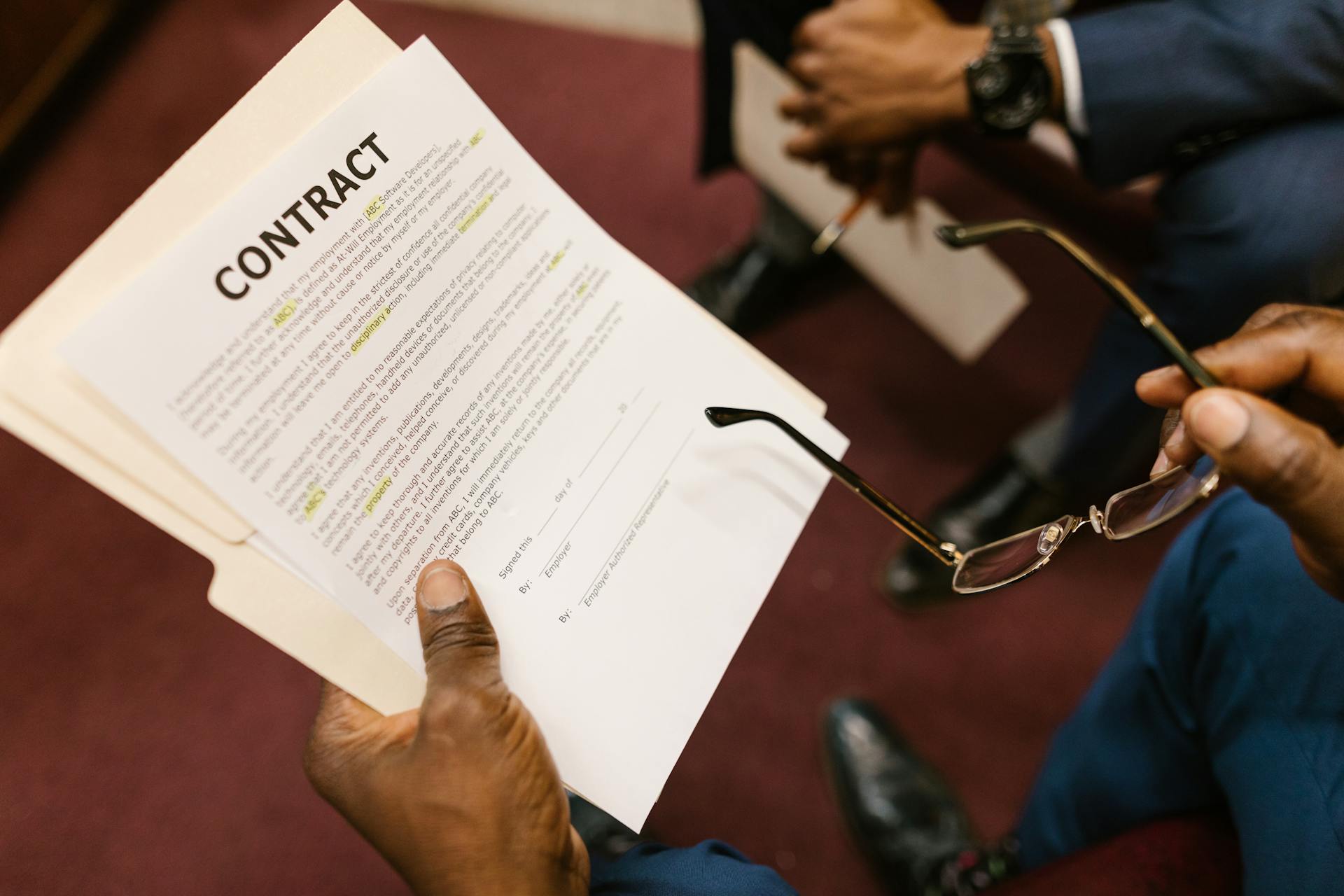
Contractual liability coverage is a type of insurance that protects businesses from financial losses due to contractual disputes or breaches.
This coverage is especially important for businesses that have contracts with customers, suppliers, or partners.
A contract is a legally binding agreement between two or more parties, and contractual liability coverage helps to mitigate the risks associated with contract disputes or non-performance.
In the event of a contract dispute, this coverage can help to cover the costs of litigation, arbitration, or other forms of dispute resolution.
What It Covers
Contractual liability coverage provides protection for your business against liability claims. This type of coverage is essential for businesses that operate on a contractual basis and assume responsibility for third-party bodily injuries and property damage.
Contractual liability insurance covers third-party liabilities, including bodily injury and property damage, which are often assumed on a property other than your own or one rented to you.
The insurance provides coverage in case of liability claims, covering your financial expenses if you are sued for damages or injuries caused to others.
Here are some specific examples of what contractual liability insurance covers:
- Third-party bodily injury
- Third-party property damage
In the event of a liability claim, your insurance will help cover the costs of damages, injuries, and lawsuit expenses.
Importance of Coverage
Contractual liability coverage is a must-have for businesses that operate on a contractual basis. Without it, you may have to pay for damage to property, injuries caused, and lawsuit expenses out of your own pocket.
Most general liability policies don't cover liability claims if a hold harmless clause is included in a contract. This can leave you vulnerable to financial losses.
The coverage limit is crucial when buying contractual liability insurance. If it doesn't adequately cover your losses, you may have to spend from your personal resources.
To properly insure your business, start with a general liability insurance policy. This will protect you against the biggest risks your company will face.
You can add a contractual liability insurance endorsement to your policy to provide extra protection. Your insurance agent can help you choose the right endorsement for your business.
A standard endorsement or a blanket endorsement are the two types of endorsements you can choose from. Your agent will review your contracts to ensure they are complete and that you have set the right limits in place.
Here are some key points to consider when choosing a contractual liability insurance policy:
Hold Harmless Agreements
A hold harmless agreement is a clause added to a contract by the party issuing it, stating that you'll be liable for third-party financial loss, bodily injury, or property damage during the contract period.
This type of agreement is a risk management strategy adopted by businesses to safeguard themselves from financial setbacks and legal expenses. It's a way for them to transfer liability to you, the contractor or service provider.
If you sign a contract with another company that includes a hold harmless agreement, you're accepting responsibility for specific risks involved during the contract period. Your business becomes liable for both losses and claims.
The indemnity agreement, also known as a hold harmless agreement, involves two parties: the Indemnitor and the Indemnitee. The Indemnitor assumes liability to protect the indemnitee.
In a contractual liability insurance policy, the indemnity agreement provides coverage for the indemnitee. The contractor is the Indemnitor, while you're the indemnitee if you transfer your liability costs to them.
The indemnity agreement is the part of the contract that transfers liability to the signor. It means you take responsibility for third-party claims that may arise during the contract.
You might like: Business Insurance Claims Examples
Blanket Endorsement
The Blanket Endorsement offers broader coverage than the standard endorsement, but it's also more expensive. This endorsement covers all contracts, automatically adding new contracts to the policy as they are signed.
A key feature of the Blanket Endorsement is that you don't need to specify individual contracts, making it a convenient option for businesses that enter into multiple contracts with various parties.
However, keep in mind that this endorsement is typically more expensive than the standard endorsement, as it provides broader coverage.
If you opt for the Blanket Endorsement, you can rest assured that all your contracts are covered, without having to manually list each one.
Here are the key differences between the Blanket and Standard Endorsements:
Ultimately, the choice between the Blanket and Standard Endorsements depends on your business's specific needs and circumstances.
Coverage Details
Contractual liability insurance provides coverage for losses due to third-party bodily injuries and property damage.
Your financial expenses are covered in the event of liability claims, giving you peace of mind as you operate your business.
Contractual liability coverage is essential for businesses that operate on a contractual basis, as most general liability policies do not offer coverage for hold harmless clauses.
Without contractual liability coverage, you may have to pay for damage to property, injuries caused, and lawsuit expenses out of your own pocket.
Contractual liability insurance is designed to fill the gap created by commercial general liability insurance policies that exclude coverage for contractual liability.
A contractual liability insurance policy provides added protection against liability claims, giving you extra financial security.
Here's a key difference between general liability and contractual liability insurance:
Contractual liability insurance is a vital addition to your business's insurance portfolio, providing protection against unforeseen risks and financial losses.
Protection
Protection is a top priority for any business owner, and contractual liability coverage is a crucial part of that protection.
Contractual liability insurance protects your business from third-party liabilities, such as injuries or property damage caused by your work or products.
You might enjoy: Business Protection Insurance
If you hire a contractor to build a flight of stairs in your home, you'll be liable in case of third-party injuries or property damage, but you can transfer the risk to the contractor with contractual liability insurance.
This type of insurance transfers the financial consequences of a contract gone wrong, not the liability itself, so you can protect your finances and avoid costly lawsuits.
Contractual liability insurance is a type of coverage that business owners add to a general liability policy to get more protection, and it's essential for any business that enters into contracts with clients or partners.
By having contractual liability insurance, you can avoid paying claims out of pocket, and instead, let the insurance policy cover the costs.
A fresh viewpoint: Does a Liability Only Auto Policy Need Uninsured Motorist Coverage
Understanding and Perspective
Contractual liability insurance is a type of insurance that protects businesses from financial losses resulting from contractual agreements. It's essential to understand that this type of insurance doesn't assume liability itself, but rather covers the financial consequences of a determined liability.
Readers also liked: What Type of Business Insurance Do I Need
A common phrase found in contracts states that one party agrees to hold another party harmless for any injuries, accidents, or losses that occur while the contract is in effect. This means that the contracting party is responsible for assuming liability and indemnifying the other party.
To properly insure a business, a small business owner should start with a general liability insurance policy, which protects against the biggest risks the company will face. This is a crucial step in ensuring that the business is protected from potential financial losses.
The terms "hold harmless", "indemnify", and "defend" have different meanings in contract language. "Hold harmless" means an agreement to assume the financial consequences of another's liability, while "indemnify" means to reimburse damages and defense costs, but it doesn't include the obligation to defend.
Here are some key differences between standard and blanket endorsements for contractual liability insurance:
Frequently Asked Questions
What is the meaning of insurance contract liabilities?
Insurance contract liabilities represent the estimated costs of paying existing claims and future benefits, as well as other expenses related to active insurance policies. This includes estimated future premiums, dividends, taxes, and investment income.
Sources
- https://www.ccinsb.com/blog/what-is-contractual-liability/
- https://archerinsgroup.com/blog/a-detailed-look-at-your-contractual-liability-insurance/
- https://www.investopedia.com/terms/c/contractual-liability-insurance.asp
- https://www.businessinsuranceusa.com/news/insurance/contractual-liability-vs-general-liability/
- https://roughnotes.com/cgl-policy-contractual-liability/
Featured Images: pexels.com


